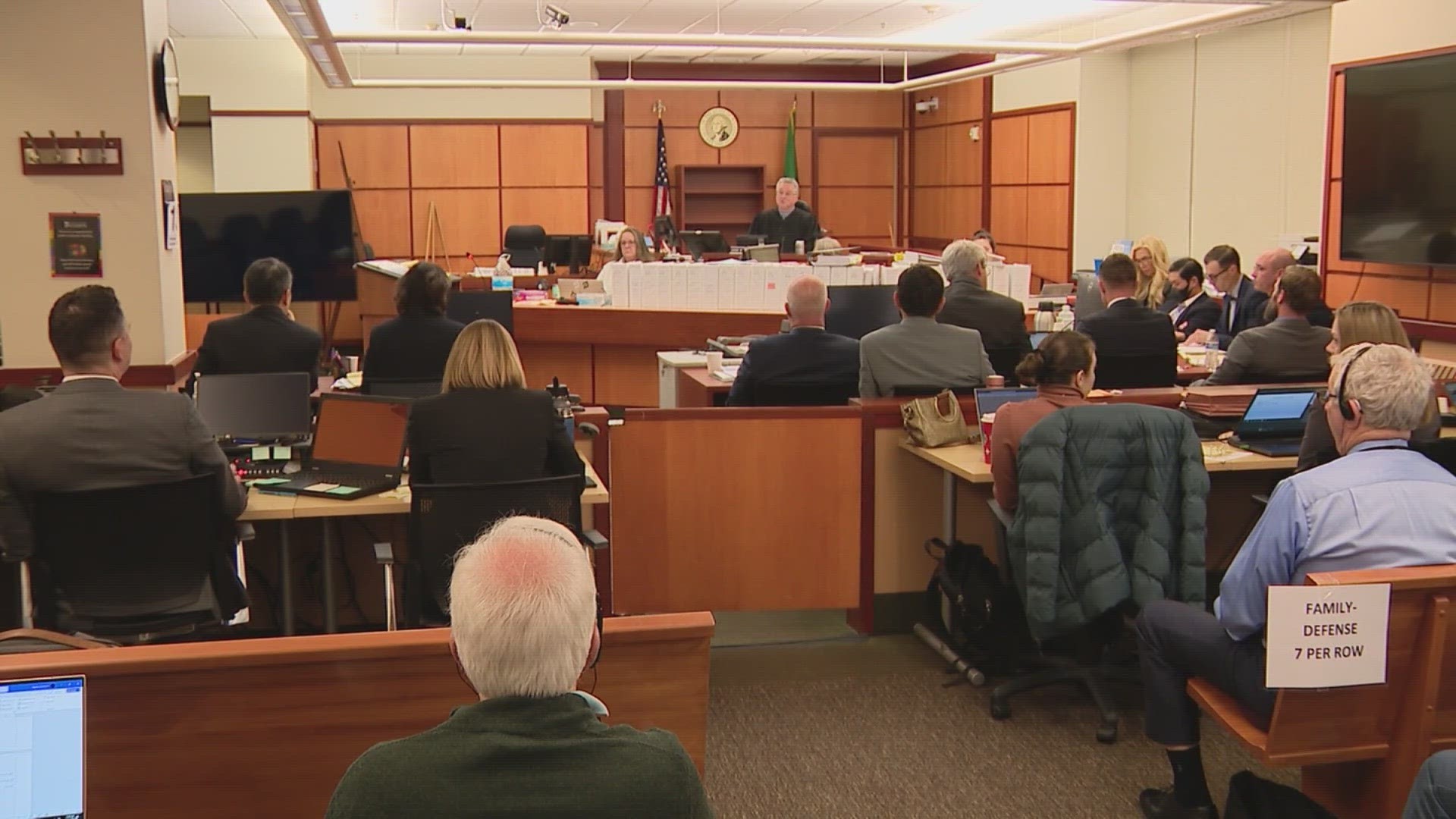TACOMA, Wash. — A jury is currently deliberating on the verdict in the trial of three Tacoma police officers accused of killing Manuel Ellis.
Ellis, a 33-year-old Black man, died in Tacoma police custody on the night of March 3, 2020 after a confrontation with police.
Officers Christopher Burbank and Matthew Collins are charged with second-degree murder and first-degree manslaughter. Officer Timothy Rankine is charged with first-degree manslaughter.
Here are more details on the potential verdicts the jury could find in this case.
For Collins and Burbank: Guilty of second-degree murder
For the officers to be found guilty of second-degree murder, the jury must find that the officers caused Ellis’ death in the commission of or in the attempt to commit a felony. The felonies listed in this case include second-degree assault with regard to the LVNR hold that Collins attempted on Ellis, third-degree assault with regard to the three Taser applications Burbank fired into Ellis’ chest, and false imprisonment, which applies if the jury finds that the officers knowingly restrained Ellis without just cause, which is what the state alleges in this case.
For Collins, Burbank and Rankine: Guilty of first-degree manslaughter
Collins and Burbank also face a first-degree manslaughter charge, which they could be convicted of if the jury finds their actions did not amount to murder in this case. This is the only charge that Officer Rankine faces.
The jury could convict the officers on this charge if they find that the officers recklessly caused Ellis’ death.
According to Washington state law, a person is reckless or acts recklessly when they know of and disregard a substantial risk that a wrongful act may occur (which in this case is Ellis’ death), and their disregard of that risk is a “gross deviation from conduct that a reasonable person would exercise in the same situation.” The state alleges that the officers were trained and made aware that the restraint methods they used against Ellis could lead to his death, and they proceeded despite that knowledge. Furthermore, they allege that a “reasonable person” or officer, in this case, would have behaved differently.
Former Pierce County Prosecuting Attorney Mark Lindquist said it's possible for the jury to find the officers guilty of murder, but not manslaughter, however, that would not make a difference in the judge's sentencing decision.
If the jury finds Collins and Burbank guilty of both second-degree murder and first-degree manslaughter, the officers will be sentenced to the greater offense, second-degree murder.
For Collins, Burbank and Rankine: The lesser-and-included charge of second-degree manslaughter
With the charge of manslaughter in the first degree, there is an automatic lesser included offense of second-degree manslaughter.
Lindquist said a defendant can be convicted of the original crime they were charged with, or a jury can find them guilty of a lesser degree of the same crime.
A person is guilty of second-degree manslaughter when they cause the death of another person “with criminal negligence.”
A person is criminally negligent when they fail to be aware of a substantial risk that a wrongful act (Ellis’ death) may occur and that person’s failure to be aware is a “gross deviation from the standard of care that a reasonable person would exercise in the same situation,” according to Washington state law.
This gives the jury space to decide that, even if the officers did not know their actions could cause Ellis’ death, they should have known, and that a reasonable person would have both been aware of that risk and behaved differently in that situation.
A hung jury
In criminal cases, a unanimous decision is required to render a verdict. If jurors cannot agree, this can result in a hung jury which would prompt a retrial.
KING 5 Analysts retired Pierce County Judge Brian Tollefson and former Pierce County Prosecuting Attorney Mark Lindquist said the court has an interest in the jury reaching a unanimous conclusion in this case and will likely press jurors before accepting a retrial.
Tollefson said the judge could poll individual jurors or just the presiding juror to see how close they are to coming to a decision.
“At the end of the day, the judge is going to give them some time even if they say they’re deadlocked,” Tollefson said. “There’s a lot of time and effort invested in this case and judges have some discretion in this area.”
Lindquist said he thinks it’s very possible for this trial to end in a hung jury but agreed with Tollefson, saying Judge Bryan Chushcoff would be unlikely to immediately accept that outcome.
“The first time they (the jury) come back and say they’re hung, the judge is going to say, ‘Go back and deliberate,’” Lindquist said. “I suspect the judge is going to send them back two or three times in hopes they can reach a verdict.”
Acquittal
If the officers are acquitted, these are the only criminal proceedings they may face for their alleged roles in causing Manuel Ellis’ death.
Under the Fifth Amendment of the U.S. Constitution, the state can only try a defendant once for any criminal offense. However, they are still subject to a civil lawsuit filed by the Ellis family against the individual officers and the Tacoma Police Department. The Pierce County Sheriff’s Department settled their portion of the lawsuit for $4 million.
The civil rights and wrongful death lawsuit brought by Ellis’ sister, Monet Carter-Mixon, was filed in 2021. The City of Tacoma is being sued for $30 million and several individual officers are also named.

